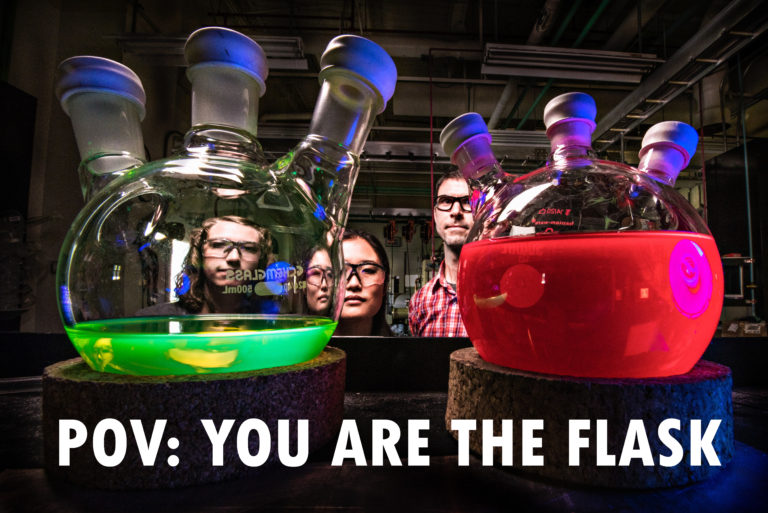
Background:
Hi! This article was written to provide students with advice on how to navigate the world of undergraduate research. In the content below, you’ll find tips for contacting professors, starting a research project, and a bunch of things I wish I knew beforehand. I find that participating in undergraduate research is a terrific way of gauging your interest in a certain field of study, graduate path, or career.
I have been involved in undergraduate research at the University of Illinois for all four years of my bachelor’s degree. For those who are curious, I majored in crop science with a concentration in plant biotechnology and molecular biology. Although most of the research I have conducted is related to the biological sciences, the information that I provide in the following article can be applied to other subjects as well.
With that being said, I am not claiming to know everything there is to know about undergraduate research! I hope this serves as a solid starting point for anyone who is interested in pursuing a degree in the sciences while gaining knowledge they can apply in the lab or workplace.
-Winston
Part I
Getting Started
This step already assumes you have found a subject that you are interested in and aren’t currently undecided about your major. Although if you are thinking about transferring to a different major, participating in undergraduate research can allow you to explore your options without fully committing.
The first step is to find a possible faculty mentor or supervisor. Go ahead and pull up your department’s home page and search under the “faculty” tab. If you can specify their research area to narrow down your search, even better! Scroll through and see if any of their research descriptions interests you. Don’t be afraid if you find yourself overwhelmed with scientific jargon you aren’t familiar with, this step serves as a quick screen.
Once you have selected your potential advisors, it’s time to explore a bit further. The ideal situation in this case is that the faculty member has a lab website that can give you valuable information on what kind of research projects are currently underway, the culture of the lab, etc. The professor/researcher will sometimes list openings for undergraduates interested in their work. If they don’t have a website, that’s okay, the next step is the same whether they have one or not.
*Tip: Assistant professors are the type of faculty member most likely to be recruiting undergraduates. They are in the early stages of setting up a lab and need naive (enthusiastic) newcomers to help with their research*

Figure 1: Photo by Humbero Arellano on Unsplash
The Next Step
Now that you’ve narrowed down possible faculty to work with, it’s time to look at some of their publications. Again, don’t feel intimidated; scroll through their recent publications (preferably <4 years old) and see if any of the titles catches your eye.
If one does, go ahead and check it out! If you feel overwhelmed by the contents, start with the abstract first (if you feel fairly confident about your ability to read research papers feel free to skip to the next section). Note down the question(s) the researchers were trying to solve and their major conclusions. Next, go through the paper and see if the figures/graphs support these findings. You won’t need to write a review article on this paper, so just take a few notes on the points I mentioned previously. Once you feel confident that you have the basic idea behind the paper and you are still interested in the faculty member’s research, it is time to move on to the fun part.
*Tip: Feel free to search for other faculty if you think that their research doesn’t match well with your goals/interests after reading some of their publications*
Establishing First Contact
So you’ve narrowed down your search to a couple of faculty members.
Now it’s time to inquire about open positions. There are several ways to go about this, but there are two approaches which I think are the most appropriate:
- Send a cold email
- Talk to them after class or during office hours
I have always either sent a cold email to the faculty member or applied to an opening on the university’s job board. A cold email approach is best if you think the professor prefers being contacted through email. You’ll use the information that you’ve gathered from their publications/lab website. A template to the cold email is provided below but I highly suggest you use your own discretion and add some personal flair!
Here is the template:
SUBJECT: Undergraduate Research Inquiry
Hello Dr. _____,
My name is _____ and I’m currently a _____ majoring in _______. My current research interests include ______, … , ______ which seem to align with current projects in your lab. I recently checked out your lab website and read a paper you authored/co-authored titled “_______”. I was especially interested in __________.
I was wondering if there are any openings for undergraduates to participate in research projects within your lab? If you are interested, I can send you a current copy of my resume as well as more information about me if needed. Thanks!
Best,
__________
And that’s it. The initial email should not take the professor more than 1-2mins to read. The template above is quick and concise while showing the professor that you are genuinely interested in their research. I also warn against sending a copy of your resume along with the initial email because I think doing so is a bit pushy, but that’s my interpretation.
I recommend choosing 2-3 professors to email at first, especially if they are in the same department. If you spam emails to professors within the same department, word might get around that you are too much of an eager beaver. Their response might take a couple of days if not a week to reach you; professors are busy people so don’t feel bad if they don’t respond right away. If after two weeks you do not get a response, feel free to send another email asking if they’ve received your initial inquiry email.
*Tip: I find that the best time to email professors for potential positions is 2-3 weeks before the start of the fall semester. This is because they haven’t been bogged down by teaching responsibilities (ex: grading tests) yet. The worst time to email professors is the month before finals.*
Sealing the Deal
So you’ve received a response from your professor of interest and they ask you if you have time to meet in order to discuss your interests and opportunities in their lab. This of course, is a good sign! That means they like your vibe and previous work experience (previous experience is not a necessity, but it helps). They will most likely ask you to come into the lab for an informal interview.
Take the interview seriously, but not too seriously if that makes sense. The interaction should be like an informal conversation and you should emphasize what makes you excited to participate in undergraduate research. Remember, professors are normal people just like the rest of us; don’t put anyone on a pedestal. Make sure to come up with 1-2 questions to ask during the interview or tour of the lab. Also ask what type of tasks/projects you would be working on if employed. Your time in undergrad is valuable, you don’t want to spend your time only doing menial tasks.
Your First Day/Week

Figure 2: Base photo by Science in HD on Unsplash, text added by me.
Congrats! You’ve been hired! The first week of being employed will likely be somewhat overwhelming. You’ll meet graduate students, lab technicians, and possibly other undergraduates. Before you actually begin conducting any research you’ll have to complete the lab safety training which is usually a couple videos followed by some short quizzes. As long as you have a pulse, you’ll pass.
Make sure to take lots of notes when anyone shows you how to do something, like for example, DNA extraction (if you are working in a biological research lab). There will be the protocol to follow but there will also be some small details that will be important later on. I remember when I was first starting out, I didn’t take any notes for the first week. When it came time for me to do an experiment/procedure I had to ask questions that had already been answered during the training.
If you are given your own digital folder to store data from experiments, keep it tidy. It will make your life a lot easier if you have to go back and look at the history of your projects. The advice that I received was that you should be able to record your experiments with enough detail so that if needed, you can repeat the experiment 10 years from now! That was good advice, because I had to compile the data from experiments for a poster presentation later on.
Part II
Expanding Your Research Experience
So you’ve been involved with undergraduate research for about a year and you’re looking to expand your research experience. This is the perfect time to consider applying to extracurricular opportunities such as internships or an REU (Research Experience for Undergraduates)! I’ll be focusing more on giving you the background behind an REU rather than applying to an internship, which is an entirely different game.
In short, REUs are programs funded by the National Science Foundation to give undergraduates the opportunity to work on research projects with really smart people at major universities. Some of the research topics include everything from the biological sciences to the social sciences. If you’re interested in something, there’s probably an REU program related to it. I’ve included a link which gives you a starting point to search for a program you’re interested in:
The Link: https://www.nsf.gov/crssprgm/reu/reu_search.jsp
As a note, I have not participated in an REU program. It’s something I wish I would’ve planned and applied for though. These programs give you serious exposure to a different research/academic environment and will look really good for applications to graduate school or other career opportunities. Another great aspect about an REU is that they give underrepresented minorities in STEM the chance to experience research!
